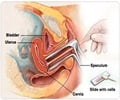A new study in the Journal of Internal Medicine has revealed that Gardasil does not trigger autoimmune conditions such as lupus

The quadrivalent HPV vaccine was licensed by the U.S. Food and Drug Administration in 2006 and recommended for young women and girls to protect against genital warts, which infects 6.2 million people annually, is the most common sexually transmitted infection in the United States, and can lead to cervical cancer in women. But autoimmune reactions have been a longstanding concern surrounding vaccination and many parents withhold the vaccine from their children because of perceived safety concerns. However, most speculated associations have stemmed from case reports that have not been confirmed by large, controlled epidemiologic studies. This study presents findings from a well-designed, post-licensure safety study of the vaccine on a large, ethnically diverse population, researchers said.
"This kind of safety information may help parents with vaccination decisions," said study lead author Chun Chao, PhD, a research scientist at the Kaiser Permanente Department of Research & Evaluation in Pasadena, Calif. "These findings offer some assurance that among a large and generalizable female population, no safety signal for autoimmune conditions was found following HPV4 vaccination in routine clinical use."
The study looked for autoimmune conditions such as immune thrombocytopenia, autoimmune hemolytic anemia, systemic lupus erythematosus, rheumatoid arthritis, juvenile rheumatoid arthritis, type 1 diabetes, Hashimoto's disease, Graves' disease, multiple sclerosis, acute disseminated encephalomyelitis, other demyelinating diseases of the central nervous system, vaccine-associated demyelination, Guillain-Barré syndrome, neuromyelitis optica, optic neuritis and uveitis.
Previous safety data on the HPV vaccine has been collected in clinical trials, as well as through the Vaccine Adverse Event Reporting System. Both have important limitations in assessing the safety profile of the vaccine. Clinical trials often include a highly selected population, with sample sizes too small, and follow-up too short, to observe rare safety events such as autoimmune conditions. The VAERS reports are often hard to interpret due to the lack of a proper comparison group and limited ability to determine whether the onset of the condition really preceded vaccination.
On the other hand, the present study, conducted at Kaiser Permanente in California, employed methods that involved in-depth medical-chart review to ensure the accuracy of diagnosis and that onset of disease was after vaccination. In addition, disease incidence in the vaccinated group was compared with a comparable unvaccinated group. As a result, this study offers important complementary safety information for the HPV vaccine.
Advertisement
Source-Eurekalert














